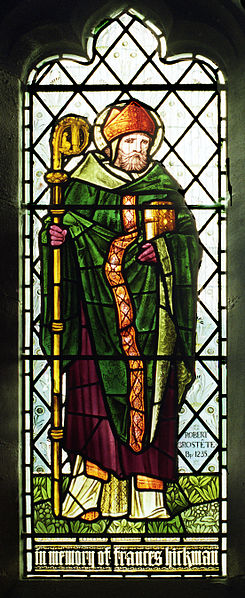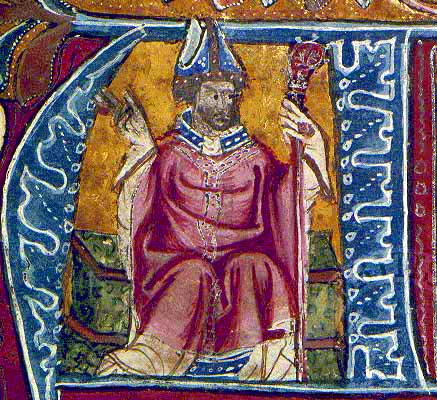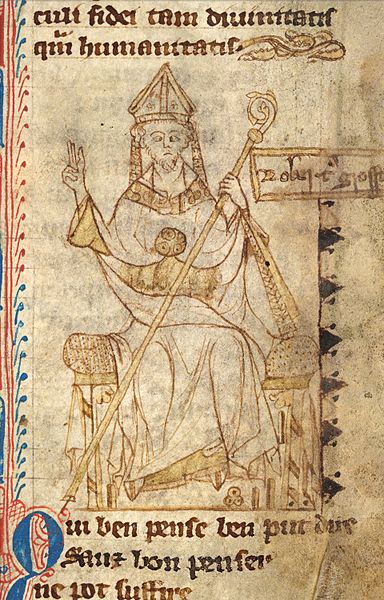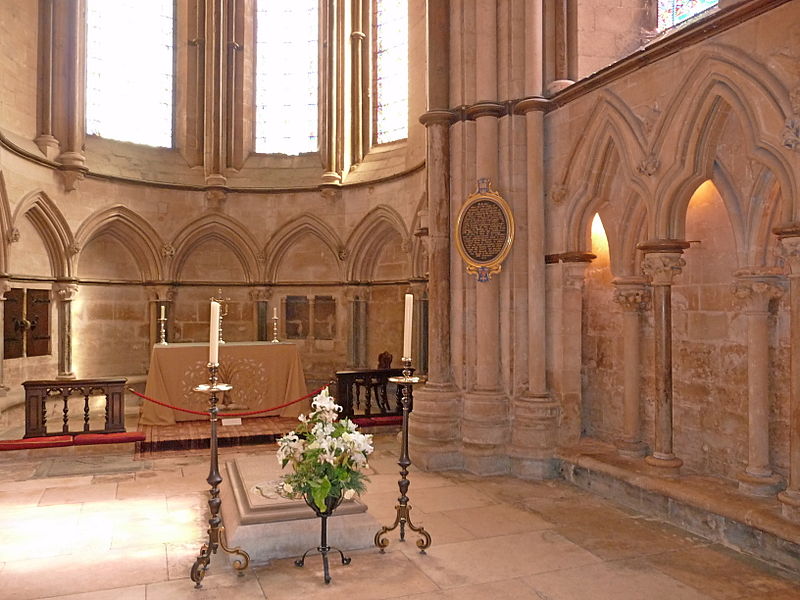<Back to Index>
- Statesman, Philosopher and Bishop of London Robert Grosseteste, 1175
PAGE SPONSOR


Robert Grosseteste or Grossetete (c. 1175 – 9 October 1253) was an English statesman, scholastic philosopher, theologian, scientist and Bishop of Lincoln. He was born of humble parents at Stradbroke in Suffolk. A.C. Crombie calls him "the real founder of the tradition of scientific thought in medieval Oxford, and in some ways, of the modern English intellectual tradition".
There is very little direct evidence about Grosseteste's education. He may have received training in the Liberal Arts at Hereford, in light of his connection to the Bishop of Hereford in the 1190s and a recommendation from Giraldus Cambrensis. It is fairly certain that Grosseteste was a master by 1192, but whether that indicated he completed a course of studies is unclear. Grosseteste acquired a position in the bishop's household, but at the death of this patron, he disappeared from the historical record. He appears again in the early thirteenth century as a judge - delegate in Hereford, but there are no specific details of where he resided or whether he had continued to study.
By 1225, he had gained the benefice of Abbotsley in the diocese of Lincoln by which time he was a deacon. On this period in his life scholarship is divided. Some historians argue that he began his teaching career in theology at Oxford in this year, whereas others have more recently argued that he used the income of this ecclesiastical post to support study in theology at the University of Paris. However, there is clear evidence that by 1229 - 30 he was teaching at Oxford, but on the periphery as the lector in theology to the Franciscans who had established a convent in Oxford about 1224. He remained at this post until March, 1235.
Grosseteste may also have been appointed Chancellor of the University of Oxford. However, the evidence for this comes from a late thirteenth century anecdote and its main claim is that Grosseteste was in fact entitled the master of students (magister scholarium).
At the same time he began lecturing in theology, the Bishop of Lincoln appointed him Archdeacon of Leicester. and he also gained a prebend that made him a canon in the Lincoln cathedral. However, after a severe illness in 1232, he resigned all his benefices (Abbotsely and Leicester), but retained his prebend. His reasons were due to changing attitudes about the plurality of benefices (holding more than one ecclesiastical position simultaneously) and that after seeking advice from the papal court, he tendered his resignations. The angry response of his friends and colleagues to his resignation took him by surprise and he complained to his sister and his closest friend, the Franciscan Adam Marsh, that his intentions had been completely misunderstood.
As a master of the sacred page (manuscripts of theology in the Latin), Grosseteste trained the Franciscans in the standard curriculum of university theology. The Franciscan Roger Bacon was his most famous disciple, and acquired an interest in the scientific method from him. Grosseteste lectured on the Psalter, the Pauline epistles, Genesis (at least the creation account), and possibly on Isaiah, Daniel and Sirach. He also led disputations on such subjects as the theological nature of truth and the efficacy of the Mosaic Law. Grosseteste also preached at the university and appears to have been called to preach within the diocese as well. He collected some of those sermons, along with some short notes and reflections, not long after he left Oxford; this is now known as his Dicta. His theological writings reveal a continual interest in the natural world as a major resource for theological reflection and a unique ability to read Greek sources (if he ever learned Hebrew it would be not until he became bishop of Lincoln). His theological index (tabula distinctionum) reveals the breadth of his learning and his desire to communicate it in a systematic manner. However, Grosseteste's own style was far more unstructured than many of his scholastic contemporaries and his writings reverberate with his own personal views and outlooks.
In February, 1235 Hugh de Wells died and the canons of Lincoln cathedral met to elect his successor. They soon were at a deadlock and could not reach a majority. Fearing that the election would be taken out of their hands, they settled on a compromise candidate, Grosseteste. He was consecrated in June of that same year at Reading. He instituted an innovative program of visitation, a procedure normally reserved for the inspection of monasteries. Grosseteste expanded it to include all the deaneries in each archdeaconery of his vast diocese. This scheme brought him into conflict with more than one privileged corporation, but in particular with his own chapter, who vigorously disputed his claim to exercise the right of visitation over their community. The dispute raged hotly from 1239 to 1245, with the chapter launching an appeal to the papacy. In 1245, while attending the First Council of Lyons, the papal court ruled in favor of Grosseteste.
In ecclesiastical politics the bishop belonged to the school of Becket. His zeal for reform led him to advance, on behalf of the courts, Christian pretensions which it was impossible that the secular power should admit. He twice incurred a rebuke from Henry III upon this subject; although it was left for Edward I to settle the question of principle in favor of the state. The devotion of Grosseteste to the hierarchical theories of his age is attested by his correspondence with his chapter and the king. Against the former he upheld the prerogative of the bishops; against the latter he asserted that it was impossible for a bishop to disregard the commands of the Holy See. Where the liberties of the national church came into conflict with the pretensions of Rome he stood by his own countrymen.
Thus in 1238 he demanded that the King should release certain Oxford scholars who had assaulted the legate Otto Candidus. But at least up to the year 1247 he submitted patiently to papal encroachments, contenting himself with the protection (by a special papal privilege) of his own diocese from alien clerks. Of royal exactions he was more impatient; and, after the retirement of Archbishop (Saint) Edmund, constituted himself the spokesman of the clerical estate in the Great Council.
In 1244 he sat on a committee which was empaneled to consider a demand for a subsidy. The committee rejected the demand, and Grosseteste foiled an attempt on the king's part to separate the clergy from the baronage. "It is written", the bishop said, "that united we stand and divided we fall."
The last years of Grosseteste's life and episcopacy were embroiled in a conflict with the new Archbishop of Canterbury, Boniface of Savoy. In 1250, he traveled to the papal court where one of the cardinals read his complaints at an audience with Innocent IV. Not only did he claim that Boniface was threatening the health of the church, the pope was just as guilty for not reining him in and that was symptomatic of the current malaise of the entire church. Most observers noted the personal animus between the bishop of Lincoln and the pope, but it did not stop the pope from agreeing to most of Grosseteste's demands about the way the English church ought to function.
Grosseteste continued to keep a watchful eye on ecclesiastical events. In 1251 he protested against a papal mandate enjoining the English clergy to pay Henry III one - tenth of their revenues for a crusade; and called attention to the fact that, under the system of provisions, a sum of 70,000 marks was annually drawn from England by the alien nominees of Rome. In 1253, upon being commanded to provide in his own diocese for a papal nephew, he wrote a letter of expostulation and refusal, not to the pope himself but to the commissioner, Master Innocent, through whom he received the mandate. The text of the remonstrance, as given in the Burton Annals and in Matthew Paris, has possibly been altered by a forger who had less respect than Grosseteste for the papacy. The language is more violent than that which the bishop elsewhere employs. But the general argument, that the papacy may command obedience only so far as its commands are consonant with the teaching of Christ and the apostles, is only what should be expected from an ecclesiastical reformer of Grosseteste's time. There is much more reason for suspecting the letter addressed "to the nobles of England, the citizens of London, and the community of the whole realm", in which Grosseteste is represented as denouncing in unmeasured terms papal finance in all its branches. But even in this case allowance must be made for the difference between modern and medieval standards of decorum.
Grosseteste numbered among his most intimate friends the Franciscan teacher, Adam Marsh. Through Adam he came into close relations with Simon de Montfort. From the Franciscan's letters it appears that the earl had studied a political tract by Grosseteste on the difference between a monarchy and a tyranny; and that he embraced with enthusiasm the bishop's projects of ecclesiastical reform. Their alliance began as early as 1239, when Grosseteste exerted himself to bring about a reconciliation between the king and the earl. But there is no reason to suppose that the political ideas of Montfort had matured before the death of Grosseteste; nor did Grosseteste busy himself overmuch with secular politics, except insofar as they touched the interest of the Church. Grosseteste realized that the misrule of Henry III and his unprincipled compact with the papacy largely accounted for the degeneracy of the English hierarchy and the laxity of ecclesiastical discipline. But he can hardly be termed a constitutionalist.
Grosseteste died on 9 October 1253. He must then have been between seventy and eighty years of age. He was already an elderly man, with a firmly established reputation, when he became a bishop. As an ecclesiastical statesman, he showed the same fiery zeal and versatility of which he had given proof in his academic career; but the general tendency of modern writers has been to exaggerate his political and ecclesiastical services, and to neglect his performance as a scientist and scholar. The opinion of his own age, as expressed by Matthew Paris and Roger Bacon, was very different. His contemporaries, while admitting the excellence of his intentions as a statesman, lay stress upon his defects of temper and discretion. But they see in him the pioneer of a literary and scientific movement; not merely a great ecclesiastic who patronized learning in his leisure hours, but the first mathematician and physicist of his age. He anticipated, in these fields of thought, some of the striking ideas to which Roger Bacon subsequently gave a wider currency.
Grosseteste is buried in a tomb within his memorial chapel within Lincoln Cathedral. Its dedicatory plaque reads as follows:
In this place lies the body of ROBERT GROSSETESTE who was born at Stradbroke in Suffolk, studied in the University of Paris — and in 1224 became Chancellor of Oxford University where he befriended and taught the newly founded orders of Friars : In 1229 he became Archdeacon of Leicester and a Canon of this Cathedral — reigning as Bishop of Lincoln from 17th. June 1235 until his death.
He was a man of learning and an inspiration to scholars a wise administrator while a true shepherd of his flock, ever concerned to lead them to Christ in whose service he strove to temper justice with mercy, hating the sin while loving the sinner, not sparing the rod though cherishing the weak — He died on 8th. October 1253.
Bishop Grosseteste University College, a stone's throw away from Lincoln Cathedral, is named after Robert Grosseteste. The University College provides Initial Teacher Training and academic degrees at all levels. In 2003, it hosted an international conference on Grosseteste in honor of the 750th anniversary of his death.
Grosseteste wrote a number of early works in Latin and French while he was a clerk, including one called Chasteau d'amour, an allegorical poem on the creation of the world and Christian redemption, as well as several other poems and texts on household management and courtly etiquette. He also wrote a number of theological works including the influential Hexaëmeron in the 1230s. He was also a highly regarded author of manuals on pastoral care and produced treatises that dealt with a variety of penitential contexts, including monasteries, the parish and a bishop's household.
However, Grosseteste is best known as an original thinker for his work concerning what would today be called science or the scientific method.
From about 1220 to 1235 he wrote a host of scientific treatises including:
- De sphera. An introductory text on astronomy.
- De luce. On the "metaphysics of light." (which is the most original work of cosmogony in the Latin West)
- De accessu et recessu maris. On tides and tidal movements. (although some scholars dispute his authorship)
- De lineis, angulis et figuris. Mathematical reasoning in the natural sciences.
- De iride. On the rainbow.
He also wrote a number of commentaries on Aristotle, including the first in the West of Posterior Analytics, and one on Aristotle's Physics, which has survived as a loose collection of notes or glosses on the text.
In his works of 1220 – 1235, in particular the Aristotelian commentaries, Grosseteste laid out the framework for the proper methods of science. Although Grosseteste did not always follow his own advice during his investigations, his work is seen as instrumental in the history of the development of the Western scientific tradition.
Grosseteste was the first of the Scholastics to fully understand Aristotle's vision of the dual path of scientific reasoning: generalizing from particular observations into a universal law, and then back again from universal laws to prediction of particulars. Grosseteste called this "resolution and composition". So for example looking at the particulars of the moon, it is possible to arrive at universal laws about nature. And conversely once these universal laws are understood, it is possible to make predictions and observations about other objects besides the moon. Further, Grosseteste said that both paths should be verified through experimentation in order to verify the principles. These ideas established a tradition that carried forward to Padua and Galileo Galilei in the 17th century.
As important as "resolution and composition" would become to the future of Western scientific tradition, more important to his own time was his idea of the subordination of the sciences. For example when looking at geometry and optics, optics is subordinate to geometry because optics depends on geometry (and so optics was a prime example of a subalternate science). Thus Grosseteste concluded, following very much in what Boethius had argued, that mathematics was the highest of all sciences, and the basis for all others, since every natural science ultimately depended on mathematics. He supported this conclusion by looking at light, which he believed to be the "first form" of all things, it was the source of all generation and motion (approximately what we know as biology and physics today). Hence since light could be reduced to lines and points, and thus fully explained in the realm of mathematics, mathematics was the highest order of the sciences.
Grosseteste's work in optics was also relevant and would be continued by Roger Bacon, who often mentioned his indebtedness to him although there is no proof that the two ever met. In De Iride Grosseteste writes:
This part of optics, when well understood, shows us how we may make things a very long distance off appear as if placed very close, and large near things appear very small, and how we may make small things placed at a distance appear any size we want, so that it may be possible for us to read the smallest letters at incredible distances, or to count sand, or seed, or any sort of minute objects.
Editions of the original Latin text may be found in: Die Philosophischen Werke des Robert Grosseteste, Bischofs von Lincoln (Münster i. W., Aschendorff, 1912.), p. 75.
Grossesteste is now believed to have had a very modern understanding of color, and supposed errors in his account have been found to be based on corrupt late copies of his essay on the nature of color, written in about 1225. The 'Ordered Universe' collaboration of scientists and historians at Durham University studying medieval science regard him as a key figure in showing that pre-Renaissance science was far more advanced than previously thought.
Grosseteste is honored in the Church of England on October 9. He is honored together with Hugh of Lincoln in the Episcopal Church (USA) on November 17.

